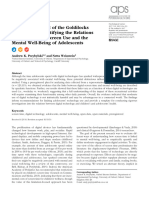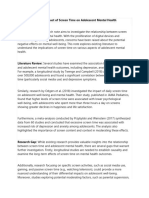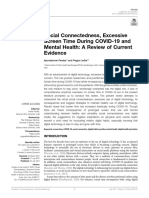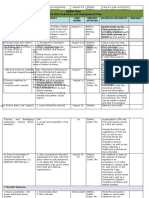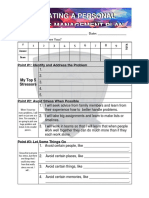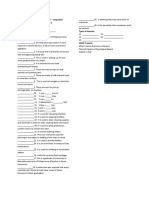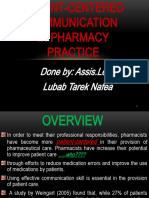RRL: ANYTHING ELSE THAT IS NOT STUDIES
1. LOCAL: Study examining influence of screen time on child development
recognized at 23rd University Scholarly Work Awards
A. PARAPHASED:
Dr. Dy's study identified significant negative impacts on children's
development linked to more than two hours of screen time per day.
Specifically, two-year-olds who were exposed to excessive screen
time showed lower scores in both receptive and expressive language
skills. Additionally, extended screen use was associated with poorer
personal development, weakened interpersonal relationships, and
reduced play and leisure abilities. The study also found a strong
connection between parents' screen habits and their children's screen
time. Children were more likely to engage in excessive screen use if
their parents had high levels of screen engagement, emphasizing the
importance of parents modeling healthy screen behaviors.
Furthermore, the study highlighted the benefits of co-viewing, where
children were less likely to overuse screen media when watching with
an adult, sibling, or other children. This suggests that active parental
involvement during screen time can help lessen some of the negative
effects of excessive screen use.
B. WHY DID I FIND THIS USEFUL?
Based on this article it showed the results of dry dys study like the guy
in our fabm jk his study provided insights regarding the potential
negative effects of excessive screen time. Although the study
primarily focuses on younger children, its findings about the impact of
excessive screen use on language development, personal skills, and
relationships can be extended to older adolescents
2. FOREIGN: Mental Health, Smartphone Use Type, and Screen Time
Among Adolescents in South Korea
A. PARAPHASED:
The study found that, on weekdays, stress perception, sleep
satisfaction, depressive symptoms, and suicide-related indicators
� worsened in both groups who used smartphones for 4 or more hours
per day. For those using smartphones for between 2 and 4 hours per
day on weekdays, the impact on mental health outcomes varied
depending on the purpose of smartphone use. On weekends, using
smartphones for 2 to 4 hours per day led to worse sleep satisfaction
but reduced suicide-related indicators in both groups. Overall, mental
health outcomes improved with smartphone use for 2 to 4 hours per
day on weekends, while they worsened with usage of 4 or more hours
per day on the same days.
B. WHY DID I FIND THIS USEFUL?
CUZ THIs strudy provides insights about the relationship or how
using smartphones in shrot screentime impacts indiviudals mental
wellbeing which aligns with our research. Their study reveals that
excessive smartphone usage which was 4 hours a day on weekdays
negatively affects stress, sleep satisfaction, depressive symptoms, and
suicide-related indicators, which helps understanding our research
topic. Their study also explains how moderate smartphone use (2-4
hours per day) has varying effects based on usage purpose. their
research also points to differences between weekday and weekend
device use, showing that while moderate usage may worsen sleep
satisfaction on weekends, it could reduce suicide-related indicators,
which offers another view of how device use affects students
differently depending on the day and usage context.
REFERENCE:
Study examining influence of screen time on child development recognized at 23rd
University Scholarly Work Awards | Ateneo de Manila University. (2024,
June 3). Ateneo De Manila University.
https://www.ateneo.edu/features/2024/06/03/study-examining-influence-
screen-time-child-development-recognized-23rd
�Taylor & Francis. (n.d.). Mental health, smartphone use type, and screen time
among adolescents in South Korea.
https://www.tandfonline.com/doi/full/10.2147/PRBM.S324235#d1e156
RRS: STUDIES
1. LOCAL: DIGITAL ENGAGEMENT AND MENTAL WELL-BEING
OF SENIOR HIGH SCHOOL STUDENTS IN A BARANGAY IN
GAPAN CITY, NUEVA ECIJA
A. PARAPHASED:
In the digital theory and research by Moritz Buchi, it is suggested that
digital engagement can lead to both positive and negative outcomes.
These effects depend on various factors that influence a person's well-
being, including subjective elements such as social group affiliation
and personal identity. The study focuses on how digital engagement
(DE) impacts the mental well-being of senior high school students,
either in a positive or negative way. The extent of their engagement is
linked to the type of digital activities they participate in, as well as
factors related to their individual backgrounds. Ultimately, the goal of
this research is to explore the connection between digital engagement
and the mental well-being of teenagers, while promoting positive
digital engagement among them. The digital media has several
benefits, including its ability to provide a vast array of new ideas and
information, enhance opportunities for social networking and support,
and facilitate easy access to health-related messages and information
dissemination. Immersive learning experiences are also considered a
key advantage of digital engagement. Social media platforms, in
particular, offer students a convenient way to collaborate on
assignments, study for exams, and complete virtual tasks. These
platforms have simplified these activities by enabling quick and
reliable communication through the internet. However, excessive use
of social media has been linked to negative outcomes, such as
disrupted sleep patterns, decreased concentration, and learning
difficulties. It also poses risks like obesity, depression, anxiety,
� exposure to fake news, and breaches of privacy and confidentiality
(Chassiakos, 2016).
B. WHY DID I FIND THIS USEFUL?
This can help our research since it has a fair share of perspectives of
the goody side and the bad bad side of digital devices hehe. In short
may balanced perspective sya on how digital devices screentime can
imopact ones wellbeing. It talks about both the positive aspects, such
as access to information, social networking, and immersive learning,
and the negative effects, like disrupted sleep, anxiety, and privacy
concerns. This can help construct a foundation our topiccc. It also
informs or gives us an understanding the potential benefits of digital
engagement, while also addressing the risks
2. FOREIGN: Effects of screentime on the health and well-being of children
and adolescents: a systematic review of reviews
A. PARAPHASED:
There is substantial evidence linking higher levels of screen time to
various health issues in children and young people (CYP), with the
strongest associations found for increased body fat, poor diet,
depressive symptoms, and reduced quality of life. However, the
evidence regarding the impact on other health outcomes is mostly
weak or nonexistent. The research found no consistent evidence of
health benefits from screen time. While there is limited evidence to
suggest a specific threshold for safe screen time exposure, there is
weak evidence that small amounts of daily screen use may not be
harmful and could even have some positive effects. These findings
support policy measures to reduce screen time for CYP, given the
negative effects on both physical and mental health. Although no clear
threshold for "safe" screen use was identified, there is weak evidence
suggesting that 2 hours of daily screen time may be linked to
depressive symptoms and lower health-related quality of life
(HRQOL). No evidence was found for different thresholds based on
age or developmental stage. Any guidelines on screen time must
consider the lack of understanding regarding how the content and
context of screen use affect health. With the rapid rise in screen time
� over the past decade, especially related to social media, further
research is urgently needed to explore the impact of screen use content
and contexts on CYP's health and well-being, particularly concerning
mobile digital devices.
B. WHY DID I FIND THIS USEFUL?
I found this useuful cause they have evidences on their study that high
levels of screen time leads to negative health outcomes such as
increased body fat, poor diet, depressive symptoms, and reduced
quality of life which aligns withj our study. It also highlights the
potential risks of excessive digital device usage. the research also
suggests that while small amounts of daily screen time may not be
harmful, excessive use—especially in relation to social media—may
contribute to mental health issues such as depression.
REFERENCE:
Bicaldo, Ferrzobel & Melinda, D & Bandalaria, D. (2023). DIGITAL
ENGAGEMENT AND MENTAL WELL-BEING OF SENIOR HIGH
SCHOOL STUDENTS IN A BARANGAY IN GAPAN CITY, NUEVA
ECIJA.
Stiglic, N., & Viner, R. M. (2019). Effects of screentime on the health and well-
being of children and adolescents: a systematic review of reviews. BMJ
Open, 9(1), e023191. https://doi.org/10.1136/bmjopen-2018-023191


